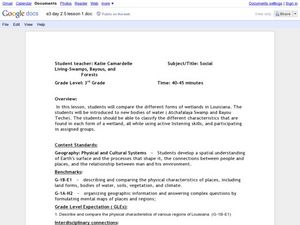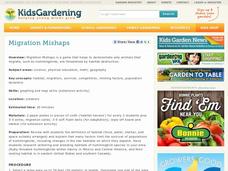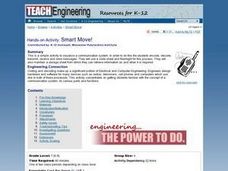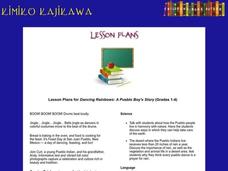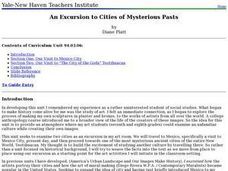Curated OER
The Revolt of Juan "Cheno" Cortina
Tenth graders examine the social and cultural impact of immigrant groups and the oppression of ethnic minorities with a focus on the role of Juan Cortina in Mexico. In small groups they discuss what a revolutionary is, read and discuss...
Curated OER
Living Swamps, Bayous and Forests
Third graders explore interesting environments by exploring Louisiana. In this wetland lesson plan, 3rd graders utilize the web to research the State of Louisiana, the bayous in the area, and the Gulf of Mexico. Students write a journal...
Curated OER
Winter Holiday Activities Extravaganza
Students define culture and explore elements that are part of the custom or culture of a place. In this holiday lesson, students identify the cultures they participate in. Students identify the differences in people's cultures....
Curated OER
Westward Expansion
Students locate California and New York on a map and explore available means of travel in the 19th century. Students explore the role of trade in pioneer America and simulate various barter transactions.
National Gardening Association
Migration Mishaps
Elementary ecologists pretend to be migratory hummingbirds. They fly between wintering and nesting grounds, trying to reach a habitat haven. In a musical-chair fashion, some birds will miss out, and are removed from the game. To further...
Curated OER
Create a World
Young scholars combine imaginative powers with known map-making techniques to create a whole new world.
Curated OER
The Formation and Value of Temperate Grasslands
Learners study the Temperate Grasslands biome of North America. They explain that it is an endangered ecosystem because the rich soils have been converted to farming in most areas. They view videos imbedded in this plan, then complete...
Curated OER
Drought Threatens Huge Man-Made Lake
Students locate Lake Mead, then read a news article about Lake Mead drying up and how that would effect water and power supplies to the region. In this current events lesson plan, the teacher introduces the article with a map and...
Curated OER
The Four Corners Region of the United States Cultures, Ruins and Landmarks
Students who live in the inner city are introduced to the four corners region of the United States. In groups, they examine how the region differs compared to where they live and their culture. They develop maps of the area and locate...
Curated OER
Communications: To the Rescue!
Students role-play as soldiers rescuing lost mountain climbers. Working in teams, they interpret maps to locate the climbers and use flashlights to send and receive coded messages about the rescue. Their goal is to complete the task in...
Agriculture in the Classroom
Design 'Y'er Genes
How do changes in DNA affect an organism? Scholars explore chromosomes, genes, DNA, and mutations by modeling the DNA of a strawberry. They build a DNA model, then manipulate it to show how changing the genes transforms the strawberry...
Curated OER
Aztec Myths 1
Young scholars write a diary entry or a letter from the viewpoint of a character in a myth. In this Aztec myths activity, students define myths and read "The Heart of Copil" and "The Eagle of Tenochtitlan" and find the land of the...
Curated OER
Four Immigrant Groups: Their Lives and Music
Fourth graders examine the experiences of four immigrant groups. Class members brainstorm a list of misconceptions of those groups and discuss if these perceptions are still present today. Using maps, groups locate the countries of...
Curated OER
Trading Up?
Students explore the benefits and drawbacks of free trade from the perspective of the United States, Canada, Brazil, Argentina, Venezuela, Chile and Mexico. For homework, they each write a letter to the editor expressing their personal...
Scholastic
Perfect Postcards: California
It's time to hear about some adventures in travel! The Transcontinental Railroad changed life and travel in the United States during the 1800s. Practicing online research skills, pupils discover the features they would like to visit on...
Curated OER
Dancing Rainbows: A Pueblo Boy's Story
Students read the book "Dancing Rainbows," and complete a variety of activities across the curriculum. In this Native Americans lesson plan, students create pottery, discuss Pueblo traditions, discuss the importance of rain, and learn...
Curated OER
Volcanoes:How Safe Are They?
Students explore volcanoes, locate them on maps, record general information about volcanoes, and organize information on a fact sheet.
Curated OER
Possible Locations
Middle schoolers create maps with cutout pieces of paper that represent caverns. They develop a scale for their map and decide where the best location is to live. They discover the importance of map reading skills.
Curated OER
The Founding of Los Angeles, California
Seventh graders examine the social and cultural impact of settler groups in California and the origins of the founding of Los Angeles, California. They read and discuss an informational handout, and discuss what it is and was like to...
Curated OER
Conquering North America
Students create a study guide on colonization of North America. In this American Colonization lesson, students complete a chart of explorers and their conquests. Students complete a crossword puzzle using explorer facts. Students read...
Curated OER
States of Fitness
Students participate in physical activities coordinating to divisions on a map.
Curated OER
An Excursion to Cities of Mysterious Pasts
Learners use the encyclopedia sources on the computer or in the library to research the historic sites and history of Mexico City. They make notes of what they find to be the most interesting for their visit. They make a large map of...
Curated OER
Effects of the Spanish Conquest
Fifth graders read and research the effects of the Spanish Conquistadors on the New World. Then they break into small groups and play a game of Jeopardy, using the facts that they have learned.
Curated OER
Regions of the US: Gulf Stream, States and Their Capitals
Fifth graders identify one way of dividing the US into geographical regions and then consider alternate ways of doing the same. They locate each of the fifty states and their capitals on a map. They research the Gulf Stream region.



